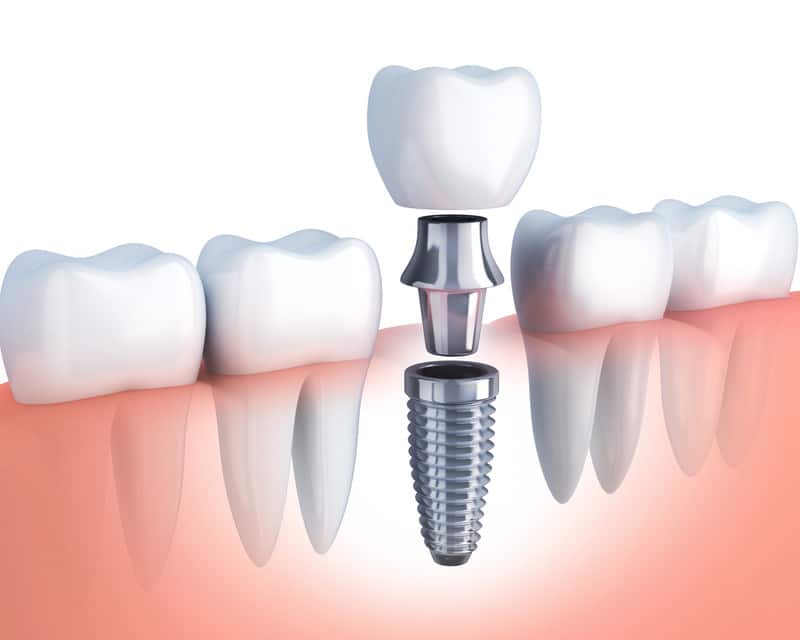Are you looking for a permanent solution for achieving your best smile? In that case, dental implants are your best bet! Visit All In One Dental Innovations to discover the longevity of implant dentistry and how implants outperform alternative short-term solutions like bridges or dentures.
Implant Dentistry vs. Dentures or Bridges
You might wonder how dental implants measure up to dentures and bridges over time. If implants are given the proper care, they can last a lifetime, and the best part is that they don’t need to be taken out or put back in each day. Dental implants give the appearance and feel of completely natural teeth. Dentures and bridges may appear to look fairly natural from a distance, but they can be easily removed, which might cause you some discomfort with your appearance without them.
Dentures and Bridges might also have to be readjusted over time as your other teeth change to avoid ill-fitting mouthpieces. When not fitted properly, dentures and bridges can cause painful irritation to the gums by rubbing up against them constantly. Those who opt for dental implants never have to worry about this issue because the implant acts as a perfect replica of a natural tooth that comfortably–and permanently–settles into the jawbone. With a dental implant, you don’t have to worry about putting it in every day and can go about your day in confidence, knowing that your smile looks naturally beautiful.
However, one thing to be cautious of when considering dental implants is a minor chance of implant failure depending on the patient and the dental surgeon installing them. Patients need to find a dental health professional with the right qualifications and procedure history to execute their surgery to succeed. It’s also crucial to thoroughly discuss your options and what type of implant is right for you depending on several factors, including the depth of your jawbone. If you have a shallow jawbone and the doctor tries to drill in the screw post part of the implant too deep, you might be at risk for potential damage to your gums, nerves, or jawbone.
Patients also should follow all pre-surgery recommendations, such as rinsing with a special oral solution and taking antibiotics to provide the doctor with the healthiest conditions to work with while operating. Suppose you and your dental care provider try to ensure the best conditions for surgery. In that case, your implant will be successful and last you many more years than other alternatives.
For more info, you can check out our complete dental implant guide.
Implant Materials Compared To Your Natural Teeth
A dental implant typically comprises three parts: crown, root, and abutment. Each is made of unique materials, but they are all designed to be durable in their environment and compatible with the human body to not cause discomfort throughout the implant’s use.
The crown is usually made of either porcelain or a zirconium substance designed to look like a natural tooth but is ultimately more stable and less susceptible to easy damage from chipping or staining. However, if a patient doesn’t properly care for their crown, the protective glaze surrounding the porcelain could wear away–making it vulnerable to discoloration and other minor issues.
The “root” of the implant is normally made of metal–often stainless steel or titanium–that has a screw-like shape, which is useful for installation into the jawbone or the gums. This unique design allows the implant post to be easily secured into the jawbone, giving the implant a tight fit and preventing it from maladjustment over time. The root’s composition also allows the gums and bones surrounding it to heal around the post, which also helps to secure it properly.
The abutment is just a small connector piece that rests on top of the root part of the implant to connect it to the crown. This connector part lies just above the gums, allowing the crown to be more securely sealed to the rest of the implant. An abutment is typically composed of materials similar to the post-part of the implant and is shaped either hexagonally or octagonally.
An Impactful Care Routine
A crucial part of ensuring that your dental implants continue to last over time is maintaining a proper care routine. Just like natural teeth, implants must be brushed, flossed, and rinsed with mouthwash daily to avoid bacterial buildup or infection. Although the actual crown of the implant won’t deteriorate like a natural crown, it can still be damaged, and the collection of bacteria on the tooth can still attack living areas like the gums, which will eventually cause periodontal disease.
Take a look at what The Silberg Center For Dental Science recommends for implant care and maintenance:
“Oral hygiene aids may include:
- An electric brush or a compact, gentle toothbrush
- Toothpaste that reduces tartar and is low-abrasive
- Using dental floss, clean the area surrounding the abutments.
Additional items that the physician could suggest are:
- Antimicrobial mouth rinses
- Interdental brushes or other aids for removing plaque between the teeth on either side of the implant(s)
- Disclosing tablets to stain the locations of plaque accumulation
It would help if you were committed to maintaining proper oral hygiene at home daily and scheduling routine dental visits. You should have a professional cleaning and examination from your dentist every three to six months. Every year, an x-ray should be taken to inspect the dental implants.”
If you’d like to know more about dental implant surgery and the long-term benefits it can provide you with, consult with our expert staff at All In One Dental Innovations by either calling us at (925) 828-9811 or stopping by our Dublin, California, location today! You can also request an appointment online!
Related article: How Safe Is A Dental Implant?

